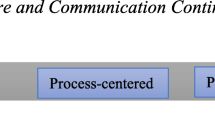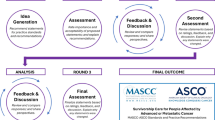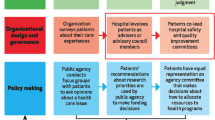Abstract
Introduction
Delivering person-centered care begins with understanding perspectives of individuals who are recipients of care about their experiences and what constitutes a “positive” experience.
Methods
This project explored views of individuals with cancer regarding their care experiences and identified aspects of care patients thought were important through a qualitative analysis of data from the Ambulatory Oncology Patient Satisfaction Survey (AOPSS). Permission was obtained from seven Canadian provinces to access de-identified written comments to a final open-ended question on the survey: Is there anything else you would like to tell us about your cancer care experience? The descriptive qualitative analysis was guided by two questions: (1) what is the nature of the written comments and (2) what are key ideas expressed about care experiences? Key ideas were collated across provinces to identify significant themes within the national sample.
Results
The sample included comments from 6232 individuals. A total of 42.5% comments were positive, 29.7% were negative, and 19.8% were mixed. Four broad themes were identified from the comments: (1) characteristics of a “positive” experience, (2) personal care, (3) interaction with health care providers, and (4) service delivery. Respondents cited being treated as a person with respect and dignity, clear communication, access to relevant and timely information, and care that takes their needs into account as important aspects. Communication, consistency, and ongoing interactions with staff were highlighted as essential elements of a positive experience, yet areas where improvements in care are necessary.
Conclusion
Patients reported a range of aspects that contribute to positive and negative care experiences which can be used to guide quality improvement initiatives in cancer centers. Results underscore the importance of having data collection systems in place to ensure agencies and providers have timely feedback about patients’ experiences and concerns in order to provide responsive and individualized care.

Similar content being viewed by others
References
Institute of Medicine (US) (2001) Committee on Quality of Health Care in America. Crossing the quality chasm: a new health system for the 21st century. National Academies Press, Washington
Coulter A (2007) Evidence on the effectiveness of strategies to improve patients’ experience of cancer care. Picker Institute Europe, Oxford
National Research Corporation Canada (2017) https://nrchealth.com/nrc-health-in-canada_rebrand/
Coronado AC, Tran K, Chadder J, Niu J, Fung S, Louzado C, Rahal R (2017) The experience of patients with cancer during diagnosis and treatment planning: a descriptive study of Canadian survey results. Curr Oncol 24(5):332–337. https://doi.org/10.3747/co.24.3782
Darzi A (2008) High quality care for all: NHS next stage review final report. Department of Health, London
Beryl Institute (2014) Defining patient experience. http://www.theberylinstitute.org/
Loiselle CG, Howell D, Nicoll I, Fitch M (2018) Toward the development of a comprehensive cancer experience measurement framework. Support Care Cancer 27:2579–2589. https://doi.org/10.1007/s00520-018-4529-y
Wagland R, Simon M, Recio A, Bracher M et al (2015) Development and testing of a text-mining approach to analyze comments on their experiences of colorectal cancer care. BMJ Quality and Safety. October 0:1–11. https://doi.org/10.1136/bmjqs-2015-004063
O’Cathain A, Thomas KJ (2004) “Any other comments?” Open questions on questionnaires—a bane or a bonus to research? BMC Med Res Methodol 4:25
Corner J, Wagland R, Glaser A et al (2013) Qualitative analysis of patients’ feedback from a PROMs survey of cancer patients in England. BMJ Open 3:e002316
Howell E, Martin J. Inpatient Survey 2007: Analysis of the patients’ free-text comments. Picker Institute Europe. http://www.nhssurveys.org/survey/736. Accessed 2 Jan 14
Thorne S (2000) Data analysis in qualitative research. Evid Based Nurs 3(3):68–70
Picker Institute (2014) Principles of patient-centered care. http://cgp.pickerinstitute.org/?page%20id=1319
Epstein RM, Fiscella K, Lesser CS, Stange KC (2010) Why the nation needs a policy push on patient-centered health care. Health Aff 29(8):1489–1495. https://doi.org/10.1377/hlthaff.2009.0888
Institute for Healthcare Improvement (2003) The breakthrough series: IHI’s collaborative model for achieving breakthrough improvement. In: IHI innovation series white paper. Institute for Healthcare Improvement, Boston
Canadian Partnership Against Cancer (2918) Living with cancer: a report on the patient experience. https://www.systemperformance.ca/report/living-with-cancer-patient-experience/?utm_source=partner-toolkit&utm_medium=arcc-newsletter&utm_campaign=patient-experience
Canadian Cancer Society (2003) Breaking down the barriers: study of cancer patient and caregiver needs in Ontario. Canadian Cancer Society, Toronto
Canadian Strategy on Cancer Control (2002) Proceedings from the national stakeholder forum. Toronto, Ontario
Canadian Strategy on Cancer Control (2005) Proceedings from the national stakeholder forum. Aylmer, Quebec
Fitch MI, Nicoll I, Keller-Olaman S (2007) Breast cancer information dissemination strategies--finding out what works. Can Oncol Nurs J 17(4):206–218
Stewart J (2001) Towards a global definition of patient-centred care. BMJ 322(7284):444–445
Bakker DA, Fitch MI, Gray R, Reed E, Bennett J (2001) Patient-health care provider communication during chemotherapy treatment: the perspectives of women with breast cancer. Patient Educ Couns 43(1):61–71
Canadian Partnership Against Cancer (2012) Screening for distress, the 6th vital sign: a guide to implementing best practices in person-centred care. Toronto, Ontario
Sullivan T, Evans W, Angus H, Hudson A (eds) (2003) Strengthening the quality of cancer services in Ontario. Canadian Healthcare Association Press, Toronto
Whitton AC, Green E, Evans WK, Fitch M, Golden B, Soman D, Gutierrez E, Holowaty E, Jadad AR (2009) The utility of publicly reported cancer treatment wait time information for patients and health care providers. Clin Oncol 21(3):218–225. https://doi.org/10.1016/j.clon.2008.12.003
Bakker DA, DesRochers C, McChesney C, Fitch M, Bennett J (2001) Community cancer clinics: patients’ perspectives. Support Care Cancer 9(4):234–240
Fitch MI, Gray RE, McGowan T, Brunskill I, Steggles S, Sellick S, Bezjak A, McLeese D (2003) Travelling for radiation cancer treatment: patient perspectives. Psycho-Oncology 12(7):664–674. https://doi.org/10.1002/pon.682
Howell D, Bultz B, Fitch M, Groff S, Williams A, Cleghorn L (2012) Ensuring a high-quality response to screening for distress data. Oncology Exchange 11(3):2–8
Acknowledgments
We acknowledge and thank the provincial cancer agencies and programs in provinces of British Columbia, Alberta, Saskatchewan, Manitoba, Prince Edward Island, Nova Scotia, and Newfoundland and Labrador for providing their data for the purposes of this analysis project.
Funding
Production of this paper has been made possible through financial support from Health Canada to the Canadian Partnership Against Cancer.
Author information
Authors and Affiliations
Corresponding author
Ethics declarations
Conflict of interest
The authors declare that they have no conflicts of interest.
Ethical approval
This is a retrospective study using de-identified survey data. All provincial cancer agencies and programs gave written permission for de-identified qualitative responses from the Ambulatory Oncology Patient Satisfaction Survey to be provided to the Canadian Partnership Against Cancer. At no time did the authors engage directly with patients, neither were they able to identify, nor make any attempt to identify them.
Disclaimer
The views expressed herein do not necessarily represent the views of Health Canada.
Additional information
Publisher’s note
Springer Nature remains neutral with regard to jurisdictional claims in published maps and institutional affiliations.
Rights and permissions
About this article
Cite this article
Fitch, M.I., Coronado, A.C., Schippke, J.C. et al. Exploring the perspectives of patients about their care experience: identifying what patients perceive are important qualities in cancer care. Support Care Cancer 28, 2299–2309 (2020). https://doi.org/10.1007/s00520-019-05057-9
Received:
Accepted:
Published:
Issue Date:
DOI: https://doi.org/10.1007/s00520-019-05057-9




